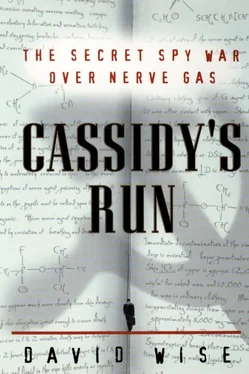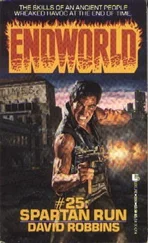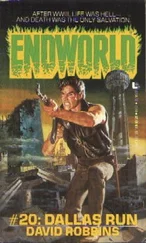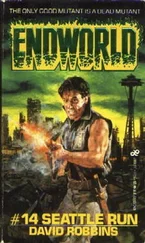And Lopez himself, Parker reasoned, would have fallen under suspicion in Moscow, since the Russians would not have known about the battle over the case between the FBI and the Justice Department. “The Soviets would have to wonder, Why did we let him go? We wanted to make them leery of why Lopez was allowed to leave the United States. We were hoping they would think Lopez had been turned.”
Keeping Cassidy in play with the Russians presented other hurdles, aside from the possibility that the operation had been compromised once the FBI had confronted the PALMETTOS. In April 1977, six months after his last meeting with the GRU, Cassidy received an envelope through the mail with a fictitious New York City return address. The one-page letter in secret writing canceled the 1977 drops and meets with no explanation. It instructed him to wait for a postcard that would give the dates of future meets and told him to check for radio messages as well. In November, however, he received another letter terminating radio transmissions until further notice. In February 1978, the FBI passed word to its counterintelligence agents that it had learned that the GRU was freezing its agent operations in the United States pending a reevaluation. Cassidy might have been caught up in an across-the-board suspension of activities.
By late summer, however, Cassidy’s link to the Russians seemed even more tenuous. On August 2, two months after the Lopezes had flown the coop, Cassidy received a plaintext greeting card from the Russians: “Departing for Europe, I’ll get in touch next summer. Mike.” The Soviets appeared, for the moment, to be keeping their options open. But the message could also be read as a good-bye note, which is how Cassidy took it.
“I was kind of down in the dumps,” he recalled. “I figured this might be the end of it. Somehow my cover was blown. And I really didn’t want it to end. It was exciting to me.” Despite Cassidy’s momentary gloom, the FBI instructed him to not give up and to try to keep in contact with the Soviets. The rock he had received at his last meeting in New York had contained instructions and specific dates for reestablishing contact should it ever be lost. The FBI approved a plan for Cassidy to attempt re-contact in New York the following year.
But a month before he left for New York, Cassidy found himself literally thrust into the public spotlight. It was an unnerving experience. Spies like to remain in the shadows, and they normally avoid attracting attention to themselves. Yet in September 1979, Cassidy unexpectedly ended up onstage with Kathie Lee Gifford at Disney World. [2] The entertainer, then twenty-six, was billed as Kathie Lee Johnson at the time.
The son-in-law of Cassidy’s old army buddy Woodrow James was appearing on the same bill in Orlando and had arranged a front-row booth at the show for the unsuspecting Cassidy.
At the time, Gifford had gained a measure of fame as the featured singer on the television game show Name That Tune. The Cassidys, enjoying the nightclub act from their ringside seats, were in for a surprise. “I didn’t know it was a setup,” Cassidy said. “She was singing and came and got me and said, ‘This is my number-one fan, the president of my fan club.’ She was on the TV show where you were supposed to guess the songs. She told me she would sing a little and when we get to the title you hum it.” They would do this a couple of times, Gifford indicated, and then she would sing all the words, revealing the title to the audience. Flustered by suddenly finding himself in the glare of the spotlight, Cassidy blew it. The acting skills that had been good enough to fool the Russians for two decades failed him. He recognized the songs. “I sang the title,” he said. “I did it each time.”
In October, Cassidy drove to New York. On the last Saturday of the month, one of the alternate dates he had been given to reestablish contact with the Soviets, he once again waited in front of the antiques store in Brooklyn, yellow package in hand and pipe in mouth. He brought along a hollow rock containing the film of the emergency planning document and his report, in secret writing, of his trip to the nuclear-weapons depot in Charleston. [3] This time Cassidy did not conceal the rock at a drop site, since his instructions did not specify one.
But no one showed, either that day or the next.
Cassidy made one last attempt. He telephoned the Soviet mission to the United Nations and asked for Mike.
“We don’t have any Mike,” he was told. “Nobody’s here.”
“Mike owes me a lot of money,” Cassidy protested. “I want my money.”
“Nobody’s here,” the operator said. “They’ve all gone to the beach.”
Cassidy was skeptical of the explanation. “It was October!” he recalled. “So I went back to Florida. That was the end of it.” It had been almost twenty-one years since Joe Cassidy had begun his risky career as a spy on a spring evening in Washington.
Not long afterward, the FBI learned that Mikhail Danilin had been posted to Canada. The bureau proposed a joint operation with Canadian intelligence. Under the plan, Cassidy would be sent to Ottawa and accidentally bump into Danilin. The GRU officer would immediately realize the encounter was no accident, that Cassidy was under American control. That in turn would jeopardize Danilin’s own position: His prime source had turned out to be a double. “The hope was that Danilin, seeing Joe, might be impelled to defect,” Jack O’Flaherty said.
The bureau contacted Cassidy, who was ready and willing to take part. “But the Canadians said no, the political climate was not right,” O’Flaherty said. “The bureau then proposed that Joe just go on his own, but Ottawa said no to that, too.”
Phil Parker pushed for the Canadian operation, though he did not really expect to turn Danilin. “I don’t know that we thought he would actually defect. He seemed a pretty solid Soviet. There was no real hope in my mind that Danilin was going to roll over and start working for the FBI.
“But if Danilin ran into Joe, he would have to report it, and that would cause some disruption. The whole idea was to play with their minds…. It would make them wonder—at what point was the case under control of the FBI? From the beginning? After two years?” In other words, the GRU would wonder whether Cassidy had been a double agent from the start or whether he was a genuine spy for Moscow who had been detected and turned by the FBI.
Soon after the FBI proposed the operation to the Canadian service, however, Danilin left Ottawa. O’Flaherty wondered whether the Canadians had approached Danilin on their own and tried to “pitch” him to defect. Danilin would have been obliged to report the approach, and he would automatically have been sent back to Moscow. [4] Both the KGB and the GRU recalled anyone who had been pitched by a Western intelligence service, in order to remove the officer from any temptation. Failure to report a pitch was regarded as a very serious offense.
On September 16, 1980, Joe and Marie Cassidy journeyed to Washington for another secret award ceremony, this time at FBI headquarters. Cassidy’s work was done. Once again, his case officers gathered to honor the man who had, in total anonymity, given so much to his country. Jimmy Morrissey was there, along with Donald Gruentzel, Jack O’Flaherty (resplendent in a three-piece suit), and Charlie Bevels.
Cassidy was presented with a simple certificate with a blue border. Its langauge was cryptic: “The Federal Bureau of Investigation expresses its appreciation to Sergeant Major Joseph Edward Cassidy for service in the public interest.” The certificate was signed “William H. Webster, Director.”
Webster also wrote a letter to Cassidy thanking him “for your accomplishments in the sensitive area of national security. You have over an extended period of time assisted FBI personnel in achieving our goal whenever called upon and your efforts were absolutely vital to our country’s defense.”
Читать дальше












